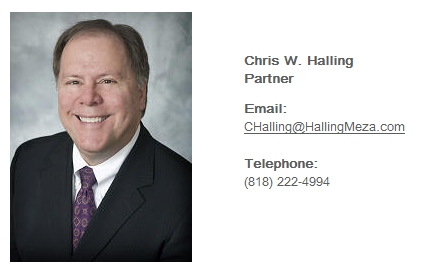Areas of Practice
Mr. Halling specializes in complex transaction and litigation work, and has significant experience in real estate, high technology, corporations, finance, and estates and trusts.
Education
Juris Doctor, University of Southern California, 1979.
Notes Editor, Southern California Law Review 1978-79.
Staff Member, Southern California Law Review 1977-78.
Note, The Federal False Claims Act: A “Remedial” Alternative for Protecting the Government from Fraudulent Practices, 52 S. Cal. L. Rev. 159 (1978).
A.B., University of California at Los Angeles, 1975
Cum Laude, Economics
Member, College of Letters and Science Honors Program.
Member, Dean’s List.
Professional Qualifications and Activities
Mr. Halling was admitted to the California State Bar in 1979, and is also admitted to practice before the Ninth Circuit Court of Appeals and United States District Court for the Central and Eastern Districts of California. He is a member of the American Bar Association Section of Science and Technology, and a past member of that Section’s Committee on Contracting For Computers. Mr. Halling also is a member of the Los Angeles County Bar Association. During 1987 to 1988 he served as a Judge Pro Tempore for the Los Angeles Municipal Court. Mr. Halling has also received an AV Rating which signifies that he has reached the top of professional excellence.
Other Activities
Mr. Halling has lectured on the legal aspects of contracting for computer technology and services before numerous industry and business organizations including the Association of Information Technology Professionals Association (AITP) and major consulting firms such as KPMG and Deloitte Consulting. He is a member of U.S.C. Law School’s support group, Legion Lex.
Published Decisions
In re Valley State Bank, 223 Cal.App.3d 221, 272 Cal.Rptr. 707 (1990). Mr. Halling represented the landlord in an action against the Federal Deposit Insurance Corporation (FDIC), as receiver of Valley State Bank in a liquidation proceeding. The Court held that the FDIC could not discharge the bank’s preclosing debt to the landlord for past due rent through issuance of a receiver’s certificate, unless it elected to terminate lease. Since the FDIC chose to adopt the lease and require that the landlord abide by its terms, it was required to cure the existing default by means of payment of $93,726 to the landlord.

